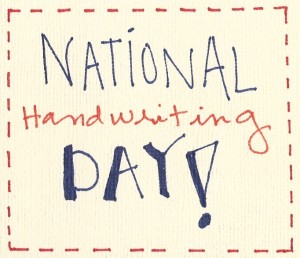Happy National Handwriting Day!
Written by Tori Whaley
Published on January 23, 2015
 National Handwriting Day is celebrated every January 23rd!
National Handwriting Day is celebrated every January 23rd!
When I was in school, I hated handwriting practice. Being left-handed, the way the teacher explained things never made sense. However, I persevered and over the years, like so many of you reading this, developed my own, recognizable script. These days, I enjoy adding an artistic flair to my signature and notes I write to family and friends.
The only compromises and changes I’ve made to my penmanship as an adult, in fact, came as a result of my excellent training at the Neuhaus Center in Houston. During training in multi-sensory language instruction, we were encouraged to teach children specific pathways for letter formation. Learning and teaching these pathways altered the way I wrote as well as gave me a valuable tool for improving my students’ performance. While handwriting is often a struggle for students with dyslexia, by teaching them consistent pathways to letter formation, I saw great improvement in their abilities and confidence in both writing and reading.
Research in Handwriting
Recent research supports my observation. A recently published New York Times piece summarizes this research nicely. Diverse research from different parts of the world comes to one conclusion: learning to write letters activates pathways in the brain, improving learning. Writing by hand is associated with learning to read faster and retaining information. In short, it simply helps us think better.
However, despite what research says about the importance of teaching handwriting, there are many who advocate for its elimination from the curriculum. The Yale Center for Dyslexia and Creativity recently published an article that seems to advocate for the elimination of such instruction for students with dyslexia. I was eager to see what research supported this recommendation, but the article provides no such evidence. While I certainly agree with their statement that “There is no reason that handwriting should keep any student from reaching her full potential,” it seems to me that it is not an “either/or” situation but rather a “both/and.” I personally began keyboard lessons as a fourth-grade student on an Apple IIE computer, with additional practice conducted on mimeographed sheets at our desks. I also received excellent handwriting instruction in the previous grades which benefited me greatly. While all students (not just students with dyslexia!) need keyboard skills to maximize their access to 21st-century technology, the benefits of handwriting instruction for spelling and reading skills and the necessity of a personal script for many tasks and activities reaffirm a place for research-backed handwriting instruction now and in the future.
If you’d like to learn more about how we can help your child struggling with reading or writing, check out our services here or contact us via email at Info@Lexercise.com.
Improve Your Child’s Reading
Learn more about Lexercise today.
Schedule a FREE
15-minute consultation

